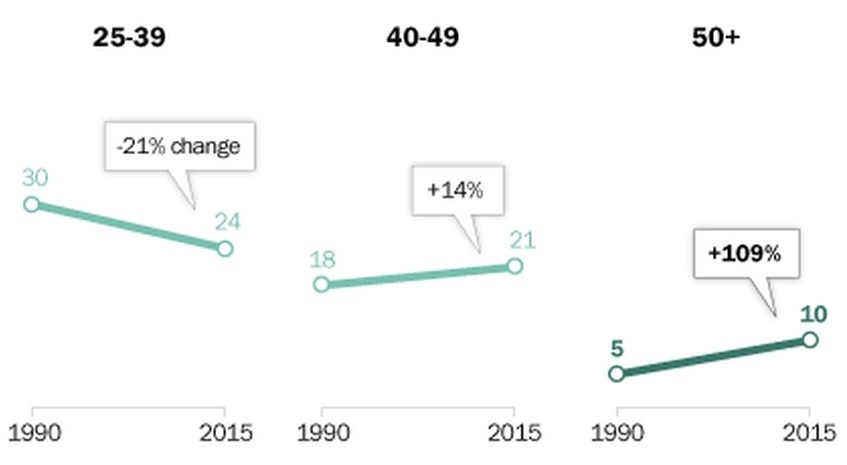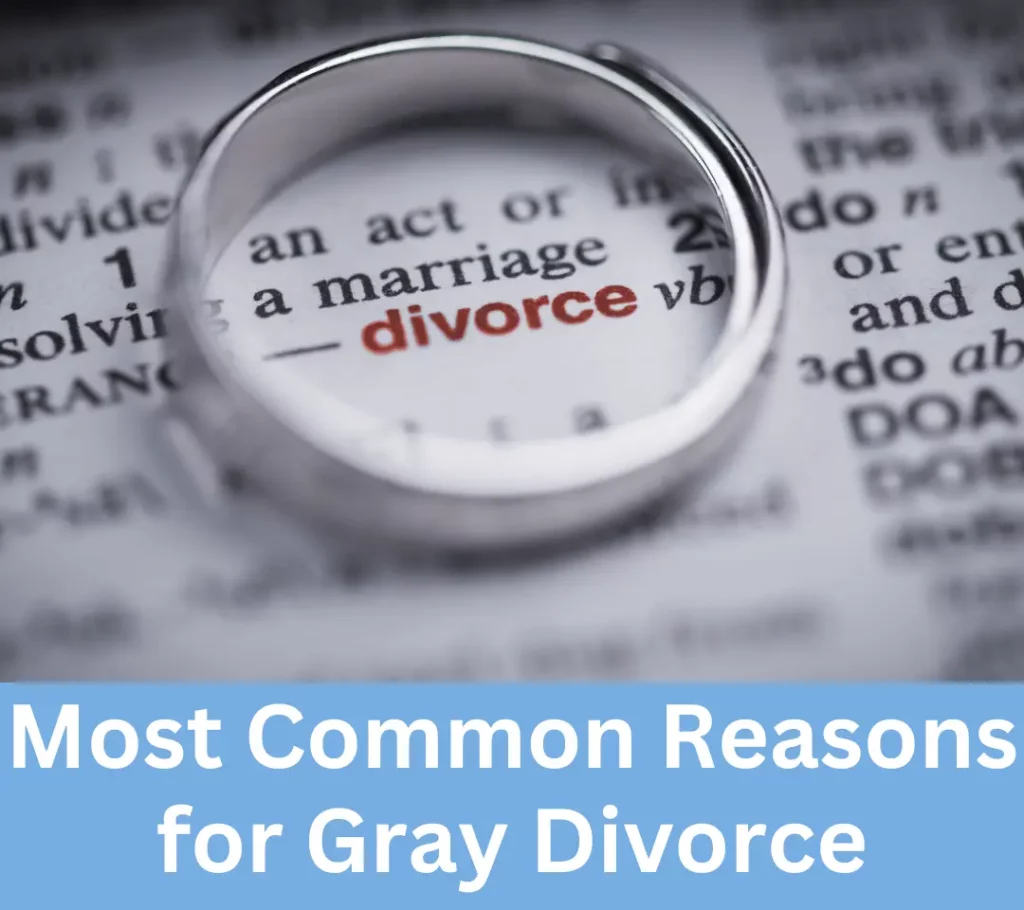I’d rather regret the things I’ve done than regret the things I haven’t done. Lucille Ball
In many cases, the preconditions for divorce become noticeable to the people around them. The couple faces misunderstandings, conflicts, recriminations, and scandals. But there is a certain category of divorce that occurs as if by accident, those around would not even think that the spouses are experiencing serious difficulties in the relationship. And such a breakup can be unexpected even for one of the partners. In such a case, experts speak of an unexpected separation or a gray divorce. The reasons for a gray divorce can be different, but most often in such a situation are couples whose age group exceeds 50-60 years. In the following statistical chart, you can see how the divorce rate among adults over 50 has increased over the past 25 years according to Pew Research Center:
Common Reasons for Gray Divorce
The following is a look at the most common grey divorce problems.
Loss of intimacy
So, what is gray divorce? Over time, couples may find that they no longer have a deep connection and that the spark in their relationship has gone out. The result can be a breakdown in the relationship. Alimony payments are no small problem, as both parties need to come to an agreement and establish how much one must pay the other based on their income and assets.
The problems of such a divorce can be different, among them:
- financial difficulties;
- division of jointly acquired property;
- emotional problems.
If there is a lack of intimacy in the relationship, against this background, trust is lost, communication deteriorates, and tensions arise between the partners, which will eventually lead to separation. As gray divorces become more common, couples need to seek professional help if they need help managing the process.
Financial Stress
This type of stress can be caused by a variety of factors, including job loss, large medical bills, or credit card debt. Financial stress can lead to arguments between couples and create tension in their relationship. This problem also prevents spouses from saving for retirement or planning for future expenses, leading to further stress and conflict between them.
In addition to financial strain, there is the problem of gray divorce alimony payments by one party. Alimony is usually paid from one spouse to the other during the marriage or after divorce proceedings to provide financial support. In some cases, the amount of the allowance can be significant, so there can be disagreements between spouses about the payment of financial support. This can cause additional stress in an already fragile relationship, prompting couples to dissolve the marriage.
Financial stress and alimony are two of the most common problems associated with gray divorces. They put a tremendous strain on the marriage, and as a result, a couple may conclude that separation is the best solution for them both financially and emotionally. Then you ought to read this article for a better understanding of the legal separation process:
Different life goals
If partners have different worldviews and different goals in life, tensions, and conflicts may arise between them if they cannot find a compromise that suits them both. The result may be a decision to end the marriage.
Gray divorce can also be caused by financial problems, such as an imbalance in alimony payments or an unequal division of property. This often occurs when one partner earns significantly more than the other and does not provide enough financial support to his or her spouse. Often, such problems are not resolved without the help of an experienced lawyer who understands how such issues are handled in court.
Lack of Communication
When there is a lack of proper and effective communication between partners, it negatively affects their relationship, which can soon lead to divorce. Without communication, it is difficult to express your feelings and thoughts, this will inevitably lead to problems or even a breakdown in the relationship.
In addition to the emotional and psychological problems that result from a lack of communication, there are also financial consequences, gray divorce. When both parties have been married for many years, it can be extremely difficult to divide jointly acquired property equitably. Without proper communication, it becomes very difficult to determine how the shared finances should be divided in a divorce. This can lead to protracted litigation as well as financial hardship for both parties. Online divorce services can provide a way to manage communication and financial division without the need for protracted litigation, making it a great option for those seeking a Washington state divorce online.
Infidelity
Infidelity and betrayal hurt a person deeply and create feelings of distrust and resentment that are hard to overcome. Marital infidelity is one of the popular reasons for a gray divorce because it is not easy to forgive betrayal. Sometimes both partners come to the common decision that feelings have faded and need to go their separate ways.
When it comes to alimony in a gray divorce, courts often take adultery into account in determining the amount of support. Whether full or partial alimony is paid depends on state law. In some states, adultery is grounds for denying alimony or for paying a partial amount. Infidelity may be considered by the court as a breach of trust and of the marriage contract between the two parties.
In a gray divorce, financial difficulties may arise because one partner has more assets than the other. There may also be difficulties transitioning from marriage to single life after many years together. There may be emotional problems, such as:
- guilt about ending a long-term relationship;
- shame in front of others;
- fear of starting over in later years.
Couples going through a gray divorce need to make sure they have the support of family and friends during this difficult time.
Unresolved conflict
If spouses choose to avoid frank conversations and don’t resolve problems, over time, negative emotions build up. Disputes over money and disagreements over parenting styles begin, and life goals may also change. Couples find that their opinions, values, and goals become too different. In other cases, couples may become stuck in an unhealthy cycle of bickering from which they cannot escape without breaking up their marriage.
If spouses refuse to compromise on certain issues, it is fraught with protracted court battles. Disputes can be costly and lengthy for both parties, resulting in an unequal division of assets and property.





